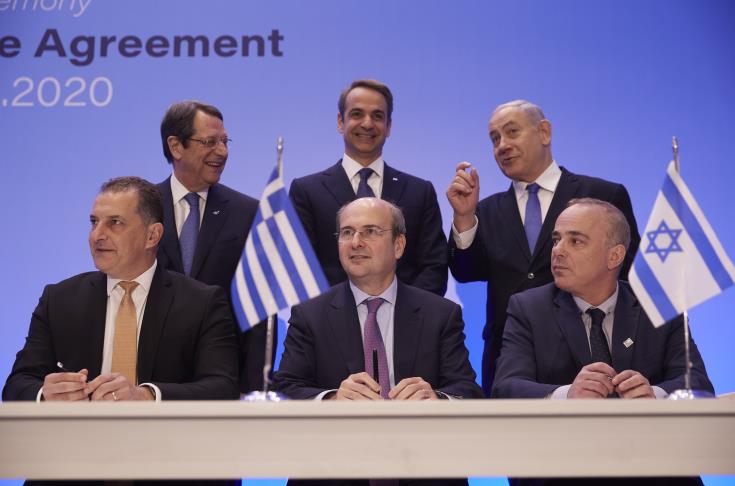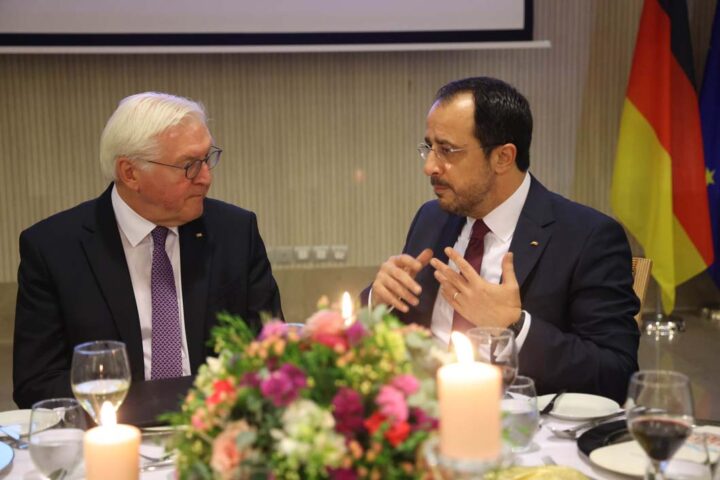Greece, Cyprus and Israel signed a milestone agreement for a huge $7 bln EastMed pipeline project to ship gas to Europe despite Turkey’s hostility to the deal.
Greek Prime Minister Kyriakos Mitsotakis, Israeli Prime Minister Benjamin Netanyahu and Cyprus President Nicos Anastasiades joined the ceremony at which their respective energy ministers signed the deal in Athens.
The leaders all stressed this was not a move against Turkey but of regional cooperation.
The signing comes amid tensions with Turkey over its activities in the region and controversial maritime deal with Libya expanding Ankara’s claims over a large gas-rich area of the sea.
The 1,900-kilometre EastMed pipeline will be able to carry between nine and 12 billion cubic meters of gas a year from offshore reserves held by Israel and Cyprus to Greece, and then on to Italy and other southeastern European countries.
The pipeline would run from Israel’s Levantine Basin offshore gas reserves to Cyprus, the Greek island of Crete and, the Greek mainland. An overland pipeline to northwestern Greece and another planned undersea pipeline would carry the gas to Italy.
The discovery of hydrocarbon reserves in the eastern Mediterranean has sparked a scramble for the energy riches and a standoff between Cyprus and Turkey.
The EastMed project is expected to make the three countries key links in Europe’s energy supply chain.
Turkey already faces European Union sanctions over ships searching for oil and gas off Cyprus.
Turkish President Recep Tayyip Erdogan envisages joint energy exploration activities with Libya in the eastern Mediterranean.
Part of the deal sets a maritime boundary between the two countries; which Greece says fails to take into account the Greek island of Crete. It also ignores the economic exclusive zone of Cyprus.
The EastMed alliance “is of enormous importance to the state of Israel’s energy future and its development into an energy power and also from the point of view of stability in the region,” Netanyahu said in a statement issued as he left Israel for Greece Thursday.
Mitsotakis said the pipeline was of “geostrategic importance” and would contribute to regional peace.
Greek Energy Minister Kostis Hatzidakis called it “a project of peace and cooperation” despite “Turkish threats.”
Anastasiades said his aim was “cooperation and not rivalry in the Middle East.”
The intergovernmental agreement for the construction of the EastMed pipeline was signed in Athens by Greece`s Environment and Energy Minister Kostis Hadzidakis, Cyprus Energy Minister George Lakkotrypis and Israeli Energy Minister Yuval Steinitz.
At a joint press conference that followed the signing ceremony, President Anastasiades said the EastMed agreement constitutes a historic milestone, which confirms in the most tangible and convincing way the trilateral cooperation between Greece, Cyprus and Israel.
He underlined that the EastMed pipeline entails immense collective benefit both for the contracting states and for the region, as it contributes to the security of energy supply of the European Union.
Geopolitical Value
“The geopolitical value of this project is highlighted by the EU’s decision to fund technical studies for the construction of the pipeline, and also by the USA that recently adopted the East Med Act.”
Anastasiades said Greece-Cyprus-Israel cooperation is founded upon the respect of international law and the shared values of solidarity with a view to promoting peace, stability and security in the turbulent region of the Eastern Mediterranean.
“Any state that wishes to participate is welcomed, on the condition that it follows the fundamental principles of international law and respects the sovereign rights and the territorial integrity of other sovereign states.”
He argued that the discovery of significant hydrocarbon reserves in the Eastern Mediterranean can strengthen interstate alliances, by multiplying their strategic value.
Anastasiades also expressed his confidence that the Israel-Cyprus-Greece electricity interconnection –also known as “EuroAsia Interconnector”– will be constructed according to the existing decisions.
Mitsotakis said the East Med pipeline provides peace and cooperation between the regional states, representing the culmination of a new geopolitical relationship.
“The East Med pipeline constitutes one of the biggest natural gas pipelines and contributes to the peace and geostrategic stability in the region.”
He said this project will upgrade Greece’s and Cyprus’ role in the regional energy supply.
“This agreement is open to all parties, on the condition that they respect international law.”
Netanyahu said the signing of the East Med agreement represents a historic moment for his country.
“I welcome the collaboration with Cyprus and Greece, which strengthens the prospects of security and prosperity in the region. We are not directed against any third country,” said Netanyahu.
He said Greece, Cyprus and Israel invite all countries to contribute to the project especially Italy and Egypt.
The countries aim to reach a final investment decision by 2022 and have the pipeline completed by 2025 to help Europe diversify its energy resources.
Greece has said the agreement will be concluded once Italy signs off on it too.









